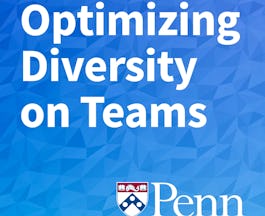Filter by
The language used throughout the course, in both instruction and assessments.
181 results for "recruitment"

Universidad de Palermo
Skills you'll gain: Strategy, Leadership and Management, Marketing, Organizational Development, Planning, Econometrics, Negotiation, Strategy and Operations, Business Communication, Communication, Decision Making, Probability & Statistics, Process Analysis, Adaptability, Business Intelligence, Collaboration, Persona Research, Probability Distribution, Accounting, Calculus, Change Management, Culture, Human Resources, Innovation, Marketing Management, Project Management, Account Management, General Statistics, Marketing Design, Behavioral Economics, Business Process Management, Customer Analysis, Finance, User Experience Design, Business, Professional Development

University of Illinois at Urbana-Champaign
Skills you'll gain: Business Design, Business Process Management, Decision Making, Leadership and Management, Organizational Development, Strategy, Strategy and Operations, Adaptability, Critical Thinking, Systems Design

Universidad de los Andes
Skills you'll gain: Entrepreneurship, Marketing, Business Design, Accounting, Communication, Business Analysis, Business Development, Leadership and Management, Negotiation, Planning, Strategy, Adaptability, Digital Marketing, Creativity, Innovation, Business Research, Financial Management, Sales, Research and Design, Finance
 Status: Free
Status: FreeUniversidad de Chile
Skills you'll gain: Planning, Professional Development

University of Western Australia
Skills you'll gain: Leadership and Management, Recruitment

University of Pennsylvania
Skills you'll gain: Collaboration, Communication, Leadership and Management, Entrepreneurship, People Management, Strategy and Operations, Culture

Rutgers the State University of New Jersey
Skills you'll gain: Leadership and Management, Procurement

University of Maryland, College Park
Skills you'll gain: Business Communication, Communication

University of Pennsylvania
Skills you'll gain: Leadership and Management, Machine Learning, People Management, Algorithms, Applied Machine Learning, Human Resources, Machine Learning Algorithms, People Analysis, Decision Making

HEC Paris
Skills you'll gain: Business Psychology, Entrepreneurship, Human Resources, Leadership Development, Leadership and Management, Organizational Development, Research and Design, Collaboration, Communication

Rutgers the State University of New Jersey
Skills you'll gain: Leadership and Management, Negotiation, Procurement

Tecnológico de Monterrey
Skills you'll gain: Leadership and Management, Communication, Critical Thinking, Negotiation, Emotional Intelligence, Strategy, Business Communication, Conflict Management, Leadership Development, Problem Solving, People Analysis, Employee Relations, People Development, Strategy and Operations, Business Analysis
In summary, here are 10 of our most popular recruitment courses
- Administración de Empresas: Universidad de Palermo
- Designing the Organization: University of Illinois at Urbana-Champaign
- Programa en Desarrollo de nuevas empresas: Universidad de los Andes
- Competencias Laborales: Perfiles, Evaluación y Capacitación.: Universidad de Chile
- Diversity and Inclusion: Developing A Strategy: University of Western Australia
- Optimizing Diversity on Teams: University of Pennsylvania
- Procurement Basics: Rutgers the State University of New Jersey
- Interview Research and Preparation: University of Maryland, College Park
- AI Applications in People Management : University of Pennsylvania
- Leading Organizations: HEC Paris










